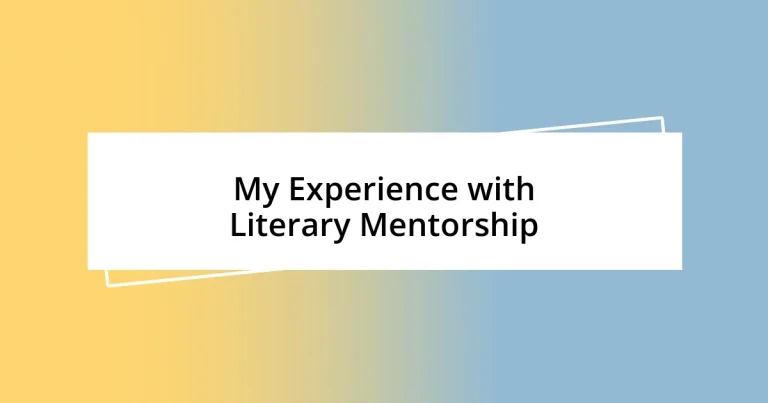Key takeaways:
- The importance of a mentor in identifying and nurturing potential, which fosters creativity and growth.
- Establishing clear goals in the mentorship relationship enhances focus and encourages personal development.
- Embracing both feedback and celebrations of achievements builds confidence and resilience in a writer’s journey.
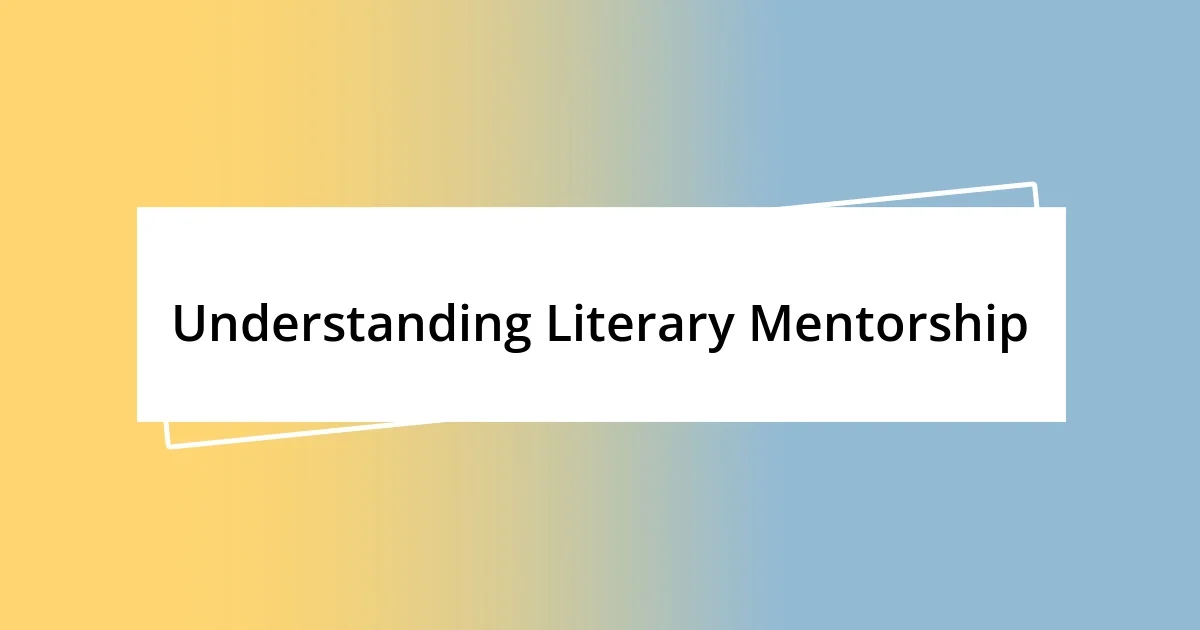
Understanding Literary Mentorship
Literary mentorship is more than just guidance; it’s about building a relationship that fosters creativity and growth. I remember my first encounter with a mentor who saw potential in me, even when I struggled to see it in myself. That initial encouragement sparked a fire within me—can you recall a moment when someone believed in you before you believed in yourself?
Throughout my journey, I’ve realized that mentoring isn’t just about sharing knowledge; it’s about inspiration. My mentor often shared their own failures, reminding me that stumbling is natural and a vital part of the writing process. It felt comforting to know that I wasn’t alone in my missteps—what if we all embraced our flaws as stepping stones toward success?
At its core, literary mentorship involves crafting a safe space where ideas can flourish. I vividly remember long conversations over coffee, discussing story structures, character development, and the joys and pitfalls of the writing life. Those discussions were more than lessons; they were building blocks of my identity as a writer. Do you remember a moment of sharing that made you feel truly seen and valued?
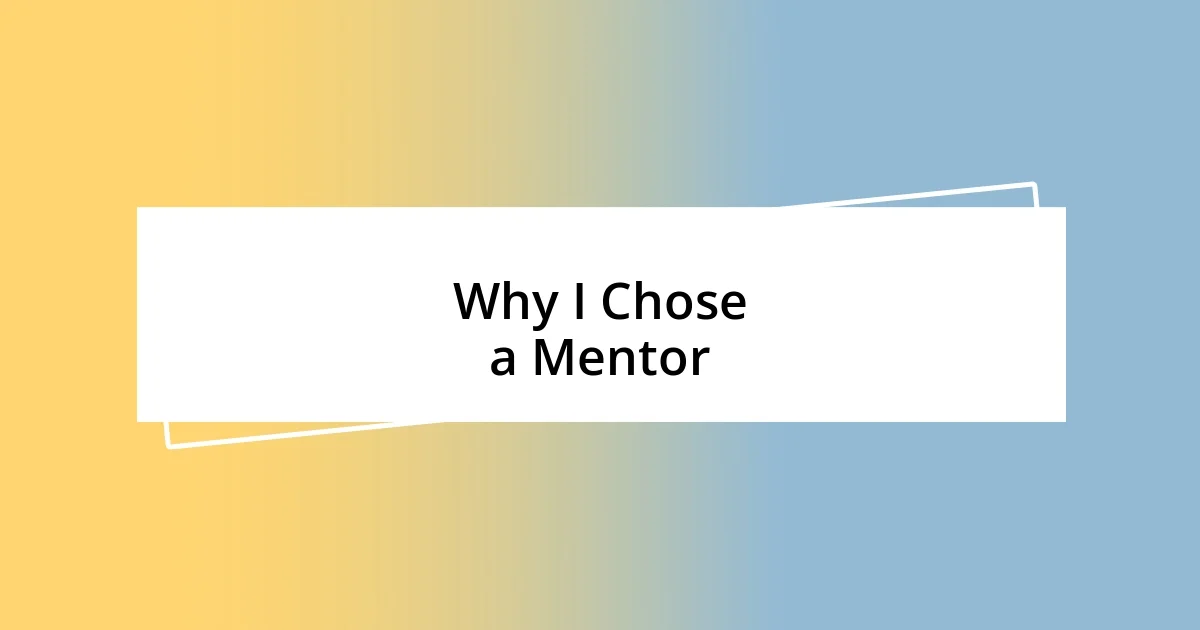
Why I Chose a Mentor
Choosing a mentor was a pivotal decision for me. I knew I needed someone with experience who could help navigate the complexities of the literary world. The idea of having a guide who understood not just the craft, but also the emotional rollercoaster of writing felt incredibly reassuring. I still recall the moment I sat down with my mentor and shared my insecurities about my work. Their compassionate response made me realize I wasn’t just seeking advice—I was looking for a partnership that would support my growth.
Here are a few reasons why I felt compelled to select a mentor:
- Experience: I wanted someone who had walked the path I was trying to navigate, who had encountered and overcome similar hurdles.
- Perspective: They provided insights that helped me see my work from different angles, enriching my writing process.
- Encouragement: Knowing that I had someone who believed in my potential motivated me to push beyond my limits.
- Networking: A mentor’s established connections opened doors for opportunities I hadn’t even known existed.
In choosing a mentor, my goal was not just to improve my writing skills, but to develop a relationship that would empower and inspire me for years to come.
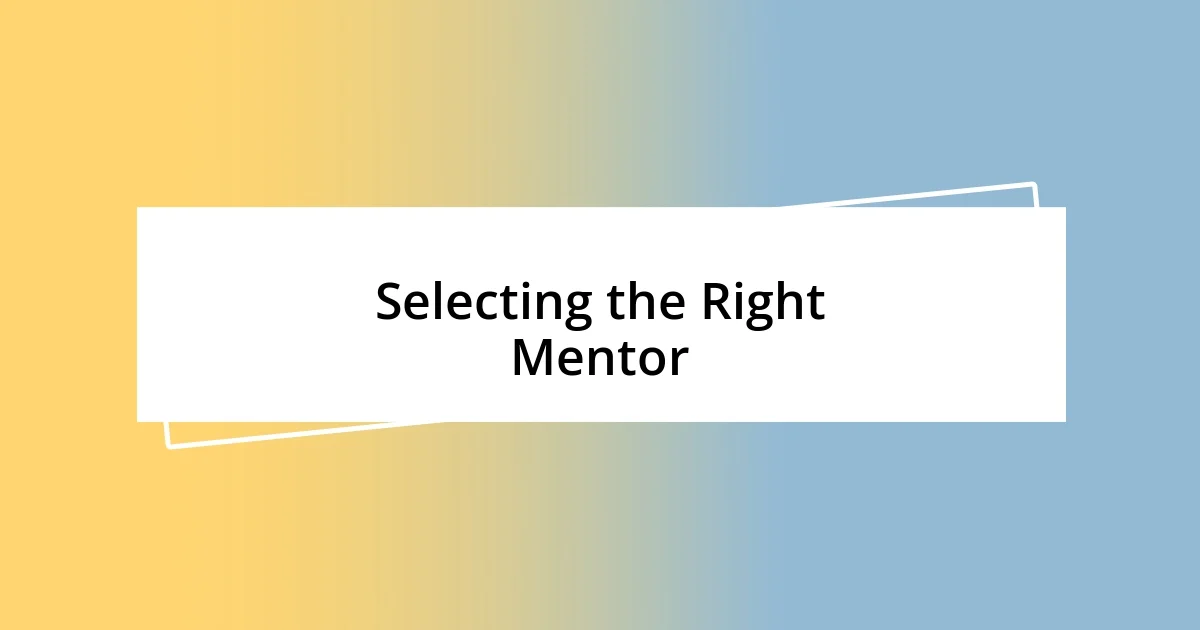
Selecting the Right Mentor
Selecting the right mentor can feel daunting, but I found it essential to reflect on my own goals and needs. For me, it wasn’t just about finding someone successful; I wanted a mentor who resonated with my artistic vision and values. I’ll never forget the moment I discovered that my mentor was not only an accomplished writer but also an advocate for diverse voices. It made me feel that my unique perspective would be cherished.
As I navigated the selection process, I learned about the importance of compatibility. Beyond just expertise, I sought someone whose approach aligned with my learning style. I vividly remember sitting in a café with a potential mentor and engaging in a spirited discussion about our favorite authors. Their enthusiasm mirrored mine and created an instant connection. Isn’t it vital, after all, for a mentor to inspire us and match our passion?
Finally, I discovered that the right mentor should challenge me while offering support. I once worked with someone who didn’t hesitate to critique my work candidly but always wrapped their feedback in encouragement. That balance made all the difference, as I felt pushed to grow without losing confidence in my abilities. How crucial is that blend of support and challenge in any mentoring relationship?
| Factors to Consider | My Experience |
|---|---|
| Experience | My mentor had a successful background in the genres I wanted to explore. |
| Compatibility | Our discussions sparked joy and creativity, indicating we would work well together. |
| Supportiveness | Critiques were given with kindness, boosting my confidence while pushing me to improve. |
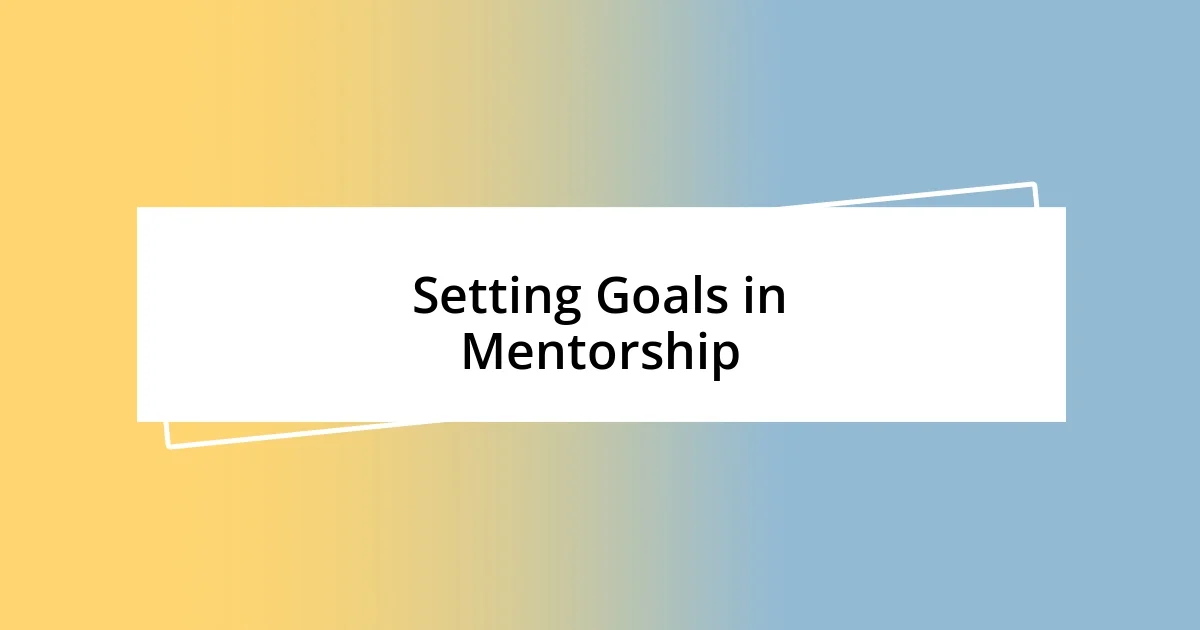
Setting Goals in Mentorship
Setting clear goals in mentorship is essential for cultivating a beneficial relationship. I remember discussing my aspirations with my mentor during our first meeting. We began mapping out specific objectives, from completing a short story to submitting it for publication. This clarity not only provided direction but made every session feel purposeful. What a relief it was to step into each meeting knowing I had tangible milestones to work towards!
Having both short-term and long-term goals was instrumental for my growth. One of the short-term goals we set was to strengthen my character development skills. Each week, I would bring a character sketch to our meetings for feedback, allowing me to refine my writing in a practical way. As I shared my progress, her insight sparked new ideas, reminding me how vital it is to have a mentor who can guide you toward your broader vision.
Reflection was equally important. At the end of our mentorship, I took time to evaluate how well I had met my goals. I remember feeling a surge of pride as I reviewed the progress I’d made with my writing. I wondered, how often do we take a moment to celebrate our achievements? This reflection not only solidified what I had learned but also set the stage for my next steps, proving that goal-setting in mentorship isn’t just about reaching targets—it’s about creating a personal journey of growth and self-discovery.
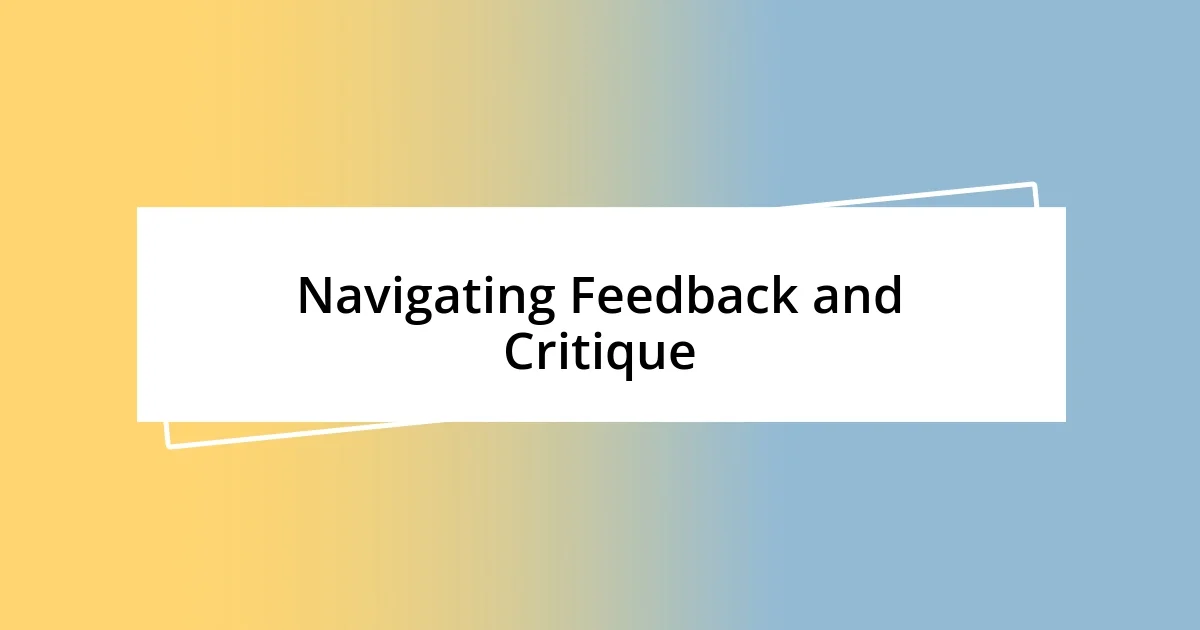
Navigating Feedback and Critique
Navigating feedback and critique can be one of the most daunting aspects of any mentoring relationship. At first, I found myself bracing for harsh comments, but I quickly learned to view feedback as a valuable tool for growth rather than a personal attack. One memorable instance involved a draft of a story I was particularly proud of, yet my mentor pointed out several areas for improvement. Instead of feeling defeated, I discovered that this kind of constructive critique helped me to refine my voice and sharpen my narrative.
As I continued to work with my mentor, I developed a system for receiving feedback. I remember making a conscious decision to approach each critique session with an open mind, armed with questions to clarify my mentor’s insights. For example, after receiving feedback on a plot twist, I would ask, “What did you think the twist revealed about the character?” That simple question opened up a dialogue that not only deepened my understanding of my story but also made our meetings more dynamic. Isn’t it fascinating how a single question can transform the way we perceive critique?
Over time, I learned to embrace both the praise and the critiques with gratitude. There was a moment when my mentor highlighted a particular scene that resonated with her, stating it was “emotionally charged.” That affirmation made me realize how important it is to celebrate our wins, no matter how small. This balanced approach to critique—embracing both strengths and weaknesses—enabled me to build resilience and trust in my writing process, ultimately leading me to produce my best work. How often do we neglect to acknowledge our successes amidst the critiques? I’ve found that giving myself permission to feel proud of both my accomplishments and my growth areas has been a game-changer.
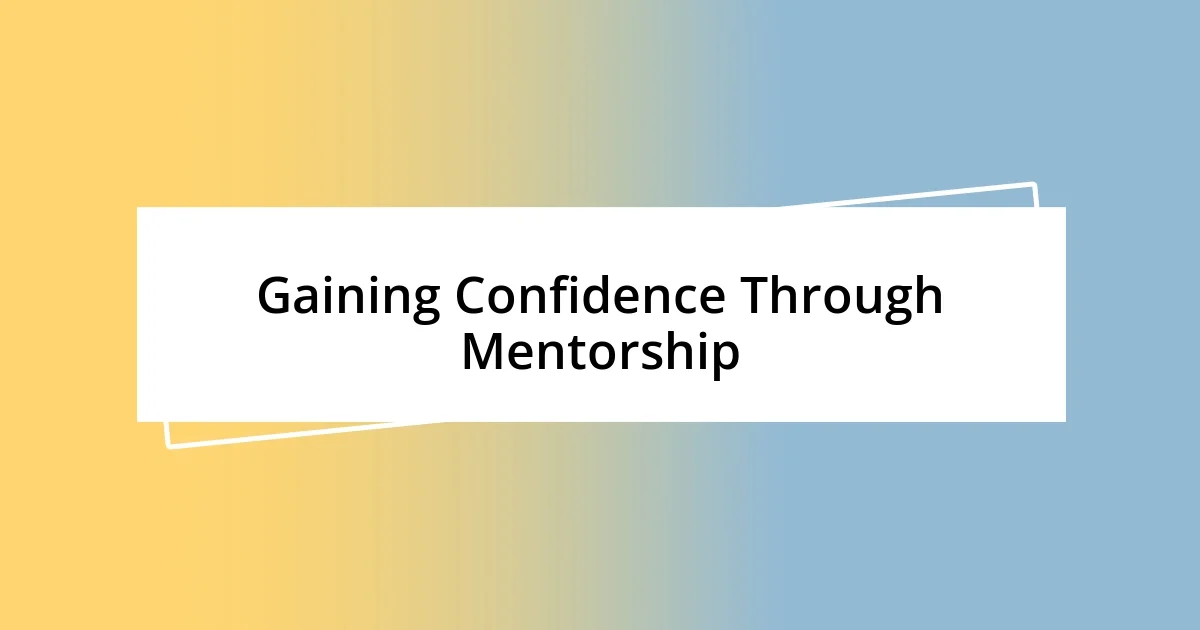
Gaining Confidence Through Mentorship
Mentorship has a remarkable way of fostering confidence, often in the most unexpected moments. I vividly recall a session when my mentor encouraged me to share my ideas without hesitation. As I laid out my thoughts on a new project, I felt my voice gaining strength. It was as if I was suddenly empowered to claim my narrative space. Isn’t it astonishing how a little encouragement can ignite a spark of self-belief?
There were times when I felt overwhelmed by self-doubt, particularly right before submissions. However, my mentor helped me view my hesitation as a common hurdle rather than a barrier. One day, she shared her own fears about releasing her first novel, and in that vulnerable moment, I realized I was not alone in this journey. How often do we think we are the only ones struggling with confidence? Knowing that even seasoned writers face these challenges reassured me and made me believe in my potential.
Celebrating small victories became a cornerstone of my growth. After completing a challenging piece, my mentor suggested we do a “victory lap” by reflecting on what I had accomplished. I remember we made a list together, and with each item, my confidence grew. It was liberating to see my progress laid out before me, turning what felt like trivial achievements into milestones worth noting. When was the last time you celebrated your own victories in writing? That practice transformed my mindset, allowing me to appreciate the journey as much as the destination.
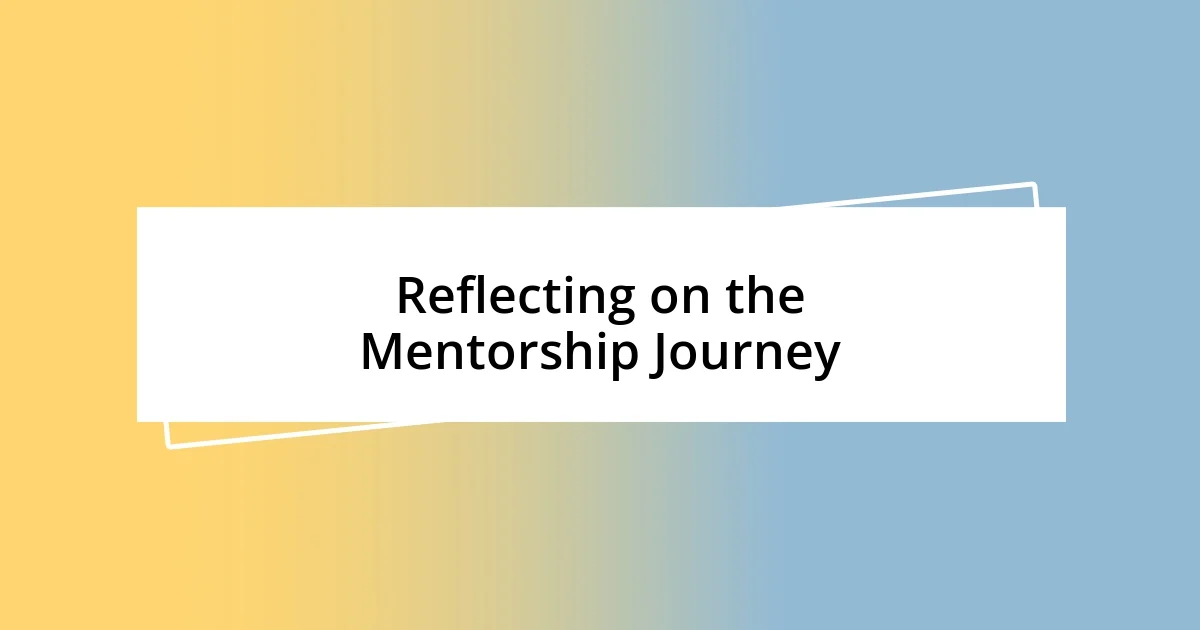
Reflecting on the Mentorship Journey
Reflecting on my mentorship journey, I often find myself replaying the conversations that shaped my experience. One instance that stands out is when my mentor shared her writing struggles, which made me realize that vulnerability is a vital part of the process. I couldn’t help but wonder—how often do we think that our mentors have it all figured out? That moment showed me we’re all navigating through uncertainty together, and it helped me feel more human in my creative journey.
Another significant aspect of my reflection is the evolution of our communication. Initially, I felt a bit intimidated, often holding back my thoughts. But as I grew more comfortable, I started suggesting ideas and probing deeper into my mentor’s feedback. I remember one pivotal session where I proposed a twist in my story, and my mentor responded enthusiastically, saying it “brought a fresh perspective.” That realization—that my voice mattered—shifted my entire approach to writing. Have you ever experienced that enlightening moment when your opinion is validated?
Lastly, I see my growth not just in the stories I crafted but also in the relationship I built with my mentor. The trust we developed created a safe space for exploration, where I felt free to take creative risks. I’ll never forget the day my mentor looked at me and said, “You’re starting to write with conviction.” Honestly, hearing those words felt like a badge of honor. It left me pondering—what does it mean to truly own your writing? It’s a journey worth taking, and through reflection, I’ve come to appreciate just how transformative mentorship can be.












